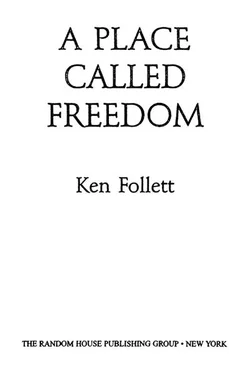Ken Follett - A Place Called Freedom (1995)
Здесь есть возможность читать онлайн «Ken Follett - A Place Called Freedom (1995)» весь текст электронной книги совершенно бесплатно (целиком полную версию без сокращений). В некоторых случаях можно слушать аудио, скачать через торрент в формате fb2 и присутствует краткое содержание. Жанр: Исторический детектив, на английском языке. Описание произведения, (предисловие) а так же отзывы посетителей доступны на портале библиотеки ЛибКат.
- Название:A Place Called Freedom (1995)
- Автор:
- Жанр:
- Год:неизвестен
- ISBN:нет данных
- Рейтинг книги:4 / 5. Голосов: 1
-
Избранное:Добавить в избранное
- Отзывы:
-
Ваша оценка:
- 80
- 1
- 2
- 3
- 4
- 5
A Place Called Freedom (1995): краткое содержание, описание и аннотация
Предлагаем к чтению аннотацию, описание, краткое содержание или предисловие (зависит от того, что написал сам автор книги «A Place Called Freedom (1995)»). Если вы не нашли необходимую информацию о книге — напишите в комментариях, мы постараемся отыскать её.
A Place Called Freedom (1995) — читать онлайн бесплатно полную книгу (весь текст) целиком
Ниже представлен текст книги, разбитый по страницам. Система сохранения места последней прочитанной страницы, позволяет с удобством читать онлайн бесплатно книгу «A Place Called Freedom (1995)», без необходимости каждый раз заново искать на чём Вы остановились. Поставьте закладку, и сможете в любой момент перейти на страницу, на которой закончили чтение.
Интервал:
Закладка:
He got to his feet.
“That was a short rest,” Lizzie said as she stood up.
“I’ll be happier when we’re out of sight of this river,” Mack said. “Jay might guess our route thus far—but this is where we shake him off.”
Reflexively they both looked back the way they had come. There was no one in sight. But Jay was on that road somewhere, Mack felt sure.
Then he realized they were being watched.
He had seen a movement out of the corner of his eye and now he saw it again. Tensing, he slowly turned his head.
Two Indians were standing just a few yards away.
This was the northern edge of Cherokee country, and they had been seeing the natives at a distance for three days, but none had approached them.
These two were boys about seventeen years old. They had the straight black hair and reddish tan skin characteristic of the original Americans, and wore the deerskin tunic and trousers the new immigrants had copied.
The taller of the two held out a large fish like a salmon. “I want a knife,” he said.
Mack guessed the two of them had been fishing in this river. “You want to trade?” Mack said.
The boy smiled. “I want a knife.”
Lizzie said: “We don’t need a fish, but we could use a guide. I’ll bet he knows where the pass is.”
That was a good idea. It would be a tremendous relief to know where they were going. Mack said eagerly: “Will you guide us?”
The boy smiled, but it was obvious he did not understand. His companion remained silent and still.
Mack tried again. “Will you be our guide?”
He began to look troubled. “No trade today,” he said doubtfully.
Mack sighed in frustration. He said to Lizzie: “He’s an enterprising kid who’s learned a few English phrases but can’t really speak the language.” It would be maddening to get lost here just because they could not communicate with the local people.
Lizzie said: “Let me try.”
She went to one of the pack horses, opened a leather satchel, and took out a long-bladed knife. It had been made at the forge on the plantation, and the letter “J,” for Jamisson, was burned into the wood of the handle. It was crude by comparison with what you could buy in London, but no doubt it was superior to anything the Cherokee could make themselves. She showed it to the boy.
He smiled broadly. “I’ll buy that,” he said, and reached for it.
Lizzie withdrew it.
The boy offered the fish and she pushed it away. He looked troubled again.
“Look,” Lizzie said. She bent over a large stone with a flat surface. Using the point of the knife she began to scratch a picture. First she drew a jagged line. She pointed at the distant mountains, then at the line. “This is the ridge,” she said.
Mack could not tell whether the boy understood or not.
Below the ridge she drew two stick figures, then pointed at herself and Mack. “This is us,” she said. “Now—watch carefully.” She drew a second ridge, then a deep V-shape joining the two. “This is the pass,” she said. Finally she put a stick figure in the V. “We need to find the pass,” she said, and she looked expectantly at the boy.
Mack held his breath.
“I’ll buy that,” the boy said, and he offered Lizzie the fish.
Mack groaned.
“Don’t lose hope,” Lizzie snapped at him. She addressed the Indian again. “This is the ridge. This is us. Here’s the pass. We need to find the pass.” Then she pointed at him. “You take us to the pass—and you get the knife.”
He looked at the mountains, then at the drawing, then at Lizzie. “Pass,” he said.
Lizzie pointed at the mountains.
He drew a V-shape in the air, then pointed through it. “Pass,” he said again.
“I’ll buy that,” Lizzie said.
The boy grinned broadly and nodded vigorously.
Mack said: “Do you think he got the message?”
“I don’t know.” She hesitated, then took her horse’s bridle and began to walk on. “Shall we go?” she said to the boy with a gesture of invitation.
He started to walk beside her.
“Hallelujah!” said Mack.
The other Indian came too.
They struck out along the bank of a stream. The horses settled into the steady gait that had brought them five hundred miles in twenty-two days. Gradually the distant ridge loomed larger, but Mack saw no sign of a pass.
The terrain rose remorselessly, but the ground seemed less rough, and the horses went a little faster. Mack realized the boys were following a trail only they could see. Letting the Indians take the lead, they continued to head straight for the ridge.
They went all the way to the foot of the mountain and suddenly turned east then, to Mack’s enormous relief, they saw the pass. “Well done, Fish Boy!” he said joyfully.
They forded a river and curved around the mountain to emerge on the far side of the ridge. As the sun went down they found themselves in a narrow valley with a fast-flowing stream about twenty-five feet wide, running northeast. Ahead of them was another ridge. “Let’s make camp,” Mack said. “In the morning we’ll go up the valley and look for another pass.”
Mack felt good. They had followed no obvious route, and the pass had been invisible from the riverbank: Jay could not possibly follow them here. He began to believe he had escaped at last.
Lizzie gave the taller boy the knife. “Thank you, Fish Boy,” she said.
Mack hoped the Indians would stay with them. They could have all the knives they wanted if they would guide Mack and Lizzie through the mountains. But they turned and went back the way they had come, the taller of the two still carrying his fish.
A few moments later they had disappeared into the twilight.
41
JAY WAS CONVINCED THEY WOULD CATCH LIZZIE today. He kept up a fast pace, driving the horses hard. “They can’t be far ahead,” he kept saying.
However, there was still no sign of the fugitives when he reached the Holston River at dusk. He was angry. “We can’t go on in the dark,” he said as his men watered their horses. “I thought we would have caught them by now.”
“We’re not far behind, calm down,” Lennox said testily. As the group traveled farther from civilization he became more insolent.
Dobbs put in: “But we can’t tell which way they went from here. There’s no trail across the mountains—any fool that wants to go has to find his own route.”
They hobbled the horses and tied Peg to a tree while Lennox prepared hominy for supper. It had been four days since they had seen a tavern, and Jay was sick of eating the mush he fed his slaves, but it was now too dark to shoot game.
They were all blistered and exhausted. Binns had dropped out at Fort Chiswell, and now Dobbs was losing heart. “I should give up and go back,” he said. “It ain’t worth fifty pounds to get lost in the mountains and die.”
Jay did not want him to go: he was the only one with any local knowledge. “But we haven’t caught up with my wife yet,” Jay said.
“I don’t care about your wife.”
“Give it one more day. Everyone says the way across the mountains is north of here. Let’s see if we can find the pass. We may catch her tomorrow.”
“And we may waste our damn time.”
Lennox spooned the lumpy porridge into bowls. Dobbs untied Peg’s hands long enough for her to eat, then tied her up again and threw a blanket over her. No one cared much for her well-being, but Dobbs wanted to take her to the Staunton sheriff: he seemed to think he would be admired for capturing her.
Lennox got out a bottle of rum. They wrapped themselves in their blankets and passed the bottle and made desultory conversation. The hours went by and the moon rose. Jay dozed fitfully. At some point he opened his eyes and saw a strange face at the edge of the circle of firelight.
Читать дальшеИнтервал:
Закладка:
Похожие книги на «A Place Called Freedom (1995)»
Представляем Вашему вниманию похожие книги на «A Place Called Freedom (1995)» списком для выбора. Мы отобрали схожую по названию и смыслу литературу в надежде предоставить читателям больше вариантов отыскать новые, интересные, ещё непрочитанные произведения.
Обсуждение, отзывы о книге «A Place Called Freedom (1995)» и просто собственные мнения читателей. Оставьте ваши комментарии, напишите, что Вы думаете о произведении, его смысле или главных героях. Укажите что конкретно понравилось, а что нет, и почему Вы так считаете.












